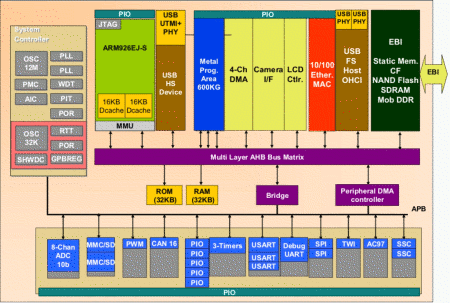Podcast reports on Embedded World 2008
Mar 21, 2008 — by Eric Brown — from the LinuxDevices Archive — 3 views The latest LinuxLink Radio episode reports on the Embedded World Conference in Nurnberg, Germany. In Episode 31 of the Timesys-sponsored series, hosts Maciej Halasz and Scott Gilbertson report on hot trends including embedded Linux, real-time operating systems (RTOSes), FPGAs, and ARM's Cortex-A8.
The latest LinuxLink Radio episode reports on the Embedded World Conference in Nurnberg, Germany. In Episode 31 of the Timesys-sponsored series, hosts Maciej Halasz and Scott Gilbertson report on hot trends including embedded Linux, real-time operating systems (RTOSes), FPGAs, and ARM's Cortex-A8.
(Click for larger view of Embedded World 2008; Source: Embedded World)
Embedded World, which was held in Nurnberg (Nuremberg), Germany on Feb. 26-28, is billed as the largest embedded development event in the world. The 2008 exhibition set new records for all key figures, claim the organizers: 675 exhibitors (up 14 percent), over 18 percent more space, and 17,341 trade visitors (up 27 per cent), with 56 percent greater international attendance.
In the free, half-hour podcast, Halasz and guest-host Gilbertson reviewed the highlights of the show. They were impressed at both the size and the organization of the event, which split booths into categories such as hardware and software.
“You could find hardware solutions for any project regardless of what you were designing,” said Halasz. “Not only were there all the big vendors like Atmel and Freescale, but also smaller channel partners with lots of designs and proof of concepts.”
The following were the most significant trends that were noted:
- Embedded Linux — There was a large increase in the number of demos that featured Linux, even when the devices supported multiple OSes, said the hosts. “Linux was by far the most popular choice for demos,” said Halasz. “It was amazing to what degree Linux has evolved to where vendors select it to best show off their new features. It's a nice way to give somebody something free of charge to let them validate the hardware.”
- Real-time — Interest seemed to be very high in real-time systems, said the hosts, with interest in real-time Linux especially keen. “People used to be afraid that Linux could not perform real-time tasks,” said Halasz. “True, it's not the very hard RTOS, but for most designs that can accept soft real-time, it performs up to expectations. It's reached a critical point where people are aware of real-time Linux, they know the shortfalls of it, and they still want to use it.”

Atmel AT91CAP9S architecture
(Click to enlarge) - Field-programmable gate arrays (FPGAs) — “It really feels like FPGAs are gaining momentum,” said Gilbertson, who noted this was partially due to dropping prices. Halasz noted the high interest in the Xilinx Virtex-5. “It's an amazing processor,” he said. “It's very flexible, and very comparable in performance with processors on a regular die. There are a lot of projects that don't have their requirements closed at the time they start building the hardware, so they really need the flexibility of an FPGA.” He added that there was also considerable interest In Atmel's customizable CAP9 (AT91CAP9S) processor, which combines an ARM9 core together with a metal-programmable function block where users can implement cores, DSPs (digital signal processors), or custom peripherals. The chip is offered on a development board that includes an FPGA.
- ARM — “A lot of people who dropped by our booth said they were going to be working with ARM,” said Gilbertson. “ARM was very popular.” Added Halasz, “There's a lot of interest in the ARM Cortex-A8, and a lot of new processors were based on it.”
- Renesas SH-4 — Halasz was especially impressed by demos of processors running the Renesas SH-4 32-bit RISC CPU core. “It can very efficiently drive multimedia applications,” he said of the Linux-compatible CPU. “It's very small, very slick, and very power efficient.”
Availability
The LinuxLink podcast, “Review of Embedded World Conference in Nurnberg,” is available for free download here.
This article was originally published on LinuxDevices.com and has been donated to the open source community by QuinStreet Inc. Please visit LinuxToday.com for up-to-date news and articles about Linux and open source.